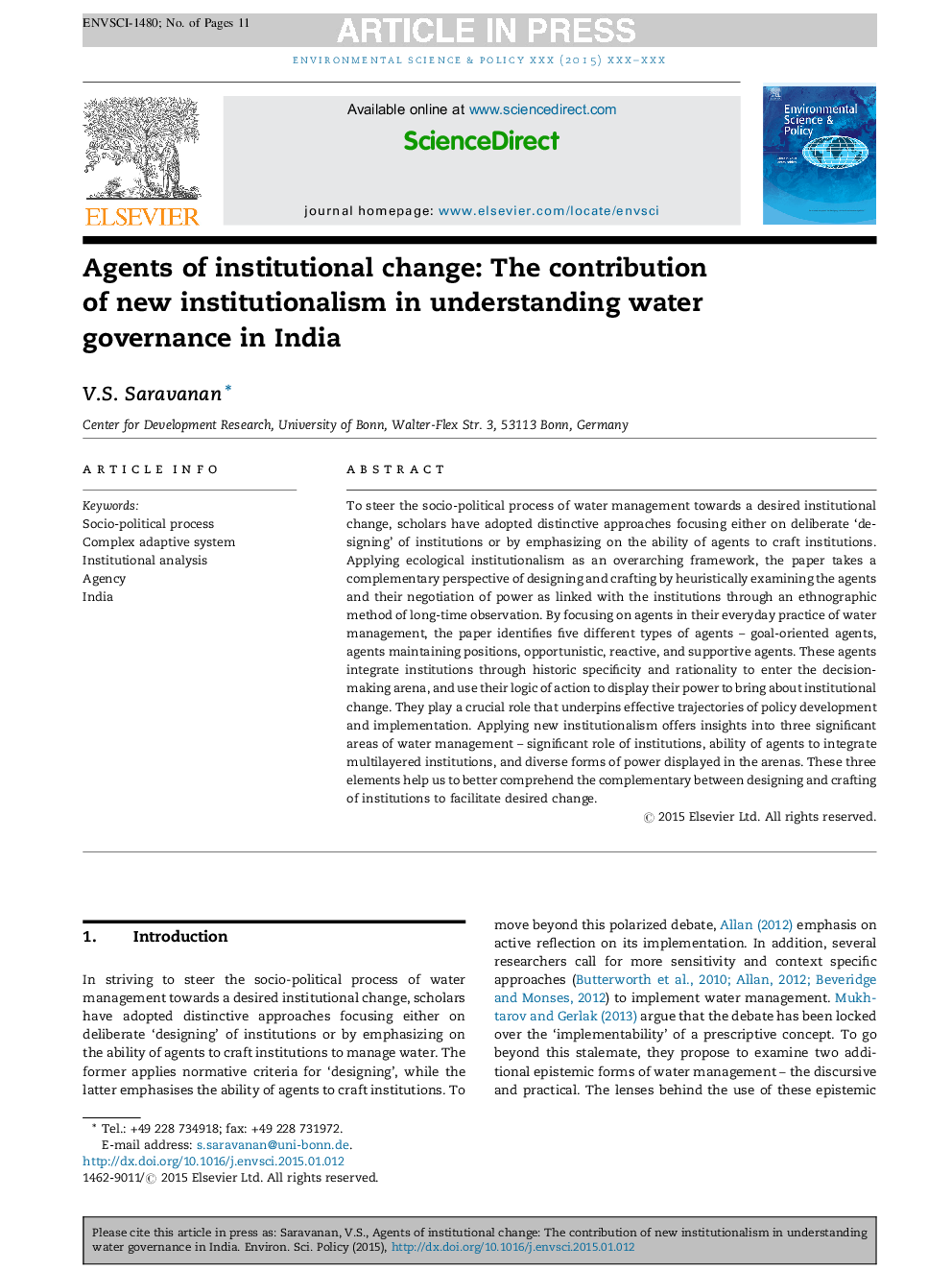| کد مقاله | کد نشریه | سال انتشار | مقاله انگلیسی | نسخه تمام متن |
|---|---|---|---|---|
| 10504588 | 946687 | 2015 | 11 صفحه PDF | دانلود رایگان |
عنوان انگلیسی مقاله ISI
Agents of institutional change: The contribution of new institutionalism in understanding water governance in India
ترجمه فارسی عنوان
نمایندگان تغییرات نهادی: سهم نهادگرایی جدید در درک اداره آب در هند
دانلود مقاله + سفارش ترجمه
دانلود مقاله ISI انگلیسی
رایگان برای ایرانیان
کلمات کلیدی
فرایند اجتماعی و سیاسی، سیستم تطبیقی پیچیده، تجزیه و تحلیل سازمانی، آژانس، هند،
ترجمه چکیده
برای مدیریت فرآیند سیاسی اجتماعی مدیریت آب به سمت یک تغییر نهادی مطلوب، محققان روشهای متفاوتی را که بر روی طراحی "عمیق" موسسات تمرکز دارند یا با تأکید بر توانایی عوامل برای ساختن نهادها، اتخاذ کرده اند. با استفاده از نهادگرایی اکولوژیکی به عنوان یک چارچوب کلی، مقاله چشم انداز مکمل طراحی و ساخت را با بررسی اکتشافی عوامل و مذاکرات آنها در رابطه با قدرت به عنوان ارتباط با موسسات از طریق یک روش قوم نگاری از مشاهدات طولانی مدت، به نمایش می گذارد. با تمرکز بر عوامل در عمل روزمره خود در مدیریت آب، مقاله پنج عامل مختلف را شناسایی می کند: عوامل هدف گرا، عوامل حفظ موقعیت، عوامل فرصتطلب، واکنش پذیر و حمایتی. این عوامل با توجه به ویژگی های تاریخی و عقلانیت، نهادها را برای ورود به عرصه تصمیم گیری، و استفاده از منطق اقدام خود برای نشان دادن قدرت خود برای ایجاد تغییرات نهادی، ادغام می کنند. آنها نقش مهمی ایفا می کنند که مسیرهای موثر توسعه و پیاده سازی سیاست ها را پایه ریزی می کند. اعمال نهادگرایی جدید، بینش سه حوزه مهم مدیریت آب را فراهم می کند: نقش مهم نهادها، توانایی عوامل برای ادغام نهادهای چند لایه و انواع مختلف قدرت نمایش داده شده در عرصه ها. این سه عنصر به ما کمک می کنند تا مکمل بین طراحی و ساخت نهادها برای تسهیل تغییرات مورد نظر را بهتر درک کنیم.
موضوعات مرتبط
مهندسی و علوم پایه
مهندسی انرژی
انرژی های تجدید پذیر، توسعه پایدار و محیط زیست
چکیده انگلیسی
To steer the socio-political process of water management towards a desired institutional change, scholars have adopted distinctive approaches focusing either on deliberate 'designing' of institutions or by emphasizing on the ability of agents to craft institutions. Applying ecological institutionalism as an overarching framework, the paper takes a complementary perspective of designing and crafting by heuristically examining the agents and their negotiation of power as linked with the institutions through an ethnographic method of long-time observation. By focusing on agents in their everyday practice of water management, the paper identifies five different types of agents - goal-oriented agents, agents maintaining positions, opportunistic, reactive, and supportive agents. These agents integrate institutions through historic specificity and rationality to enter the decision-making arena, and use their logic of action to display their power to bring about institutional change. They play a crucial role that underpins effective trajectories of policy development and implementation. Applying new institutionalism offers insights into three significant areas of water management - significant role of institutions, ability of agents to integrate multilayered institutions, and diverse forms of power displayed in the arenas. These three elements help us to better comprehend the complementary between designing and crafting of institutions to facilitate desired change.
ناشر
Database: Elsevier - ScienceDirect (ساینس دایرکت)
Journal: Environmental Science & Policy - Volume 53, Part B, November 2015, Pages 225-235
Journal: Environmental Science & Policy - Volume 53, Part B, November 2015, Pages 225-235
نویسندگان
V.S. Saravanan,
